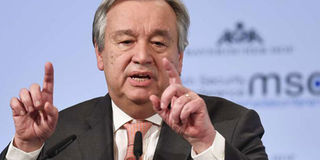UN’s culture of silence allows sexual harassment to continue

UN Secretary-General Antonio Guterres gives a speech during the 54th Munich Security Conference on February 16, 2018 in Munich, southern Germany. He has instituted a new directive that allows staff to report cases of sexual harassment through a confidential helpline. PHOTO | THOMAS KIENZLE | AFP
What you need to know:
- Most women at the UN do not report sexual harassment or other forms of abuse because the highly hierarchical, male-dominated environment.
- UK International Development Secretary Penny Mordaunt says she will withdraw funding from aid organisations that do not take sexual harassment or abuse seriously.
In the past decade, Haiti has received massive amounts of aid that has done little to improve the living conditions of the people, who have endured civil unrest, earthquakes and all manner of calamities in recent years.
On the contrary, each human or natural disaster brings more grief made worse by none other than aid workers who have, among other complaints, been accused of infecting the population with cholera and sexually exploiting the very people they are supposed to be protecting.
The latest scandal to emerge is the one at the much-respected British charity Oxfam, whose staff have been implicated in organising sex parties with Haitian women.
An investigation by the UK’s Times newspaper found that none other than Oxfam’s country director in Haiti hired prostitutes, some of whom might have been underage girls.
CHILD SEX
Unlike the United Nations, however, where such inappropriate behaviour would have had little negative impact on the accused, the director was “permitted to resign” in 2011.
Several donors, including the UK Government, have threatened to withdraw support to Oxfam, which has been accused of a cover-up.
Sexual abuse or exploitation of women and children by UN peacekeepers in Haiti has also been reported.
Last year, an Associated Press investigation revealed that peacekeepers from Sri Lanka were involved in a child sex ring.
Despite the harrowing testimonies of the victims, none of the peacekeepers were court-martialled by their country’s military or reprimanded by the UN – though there has been talk of sanctioning countries whose peacekeepers are implicated in child sex abuse.
RAPES
Mr Andrew McLeod, a former high-ranking UN official, who now advocates tough penalties for aid workers implicated in sex crimes, says that aid organisations tend to attract “predatory paedophiles” because their work allows them easy access to vulnerable children.
What’s worse, the culture of silence allows such wrongdoing to continue.
He estimates that at least 60,000 rapes have been carried out by UN personnel in the last decade and that more than 3,000 paedophiles are working for the organisation.
Recently, I wrote in this column that while stories of sexual harassment were finally coming out in the open in Hollywood, thanks to the Harvey Weinstein scandal, it was unlikely that such would emerge from the UN.
However, in recent days, former UN staff members have spoken about sexual harassment and other types of abuse that they or the people they were supposed to be helping have endured.
CULTURE OF SILENCE
In an article published this month in Forbes, Dr Lori Handrahan, a gender expert, says that when she raised the issue of a “food-for-sex” scandal at the refugee agency, UNHCR, she was ordered not to talk about it.
When her article on the sexual abuse of female refugees was published in The New York Times, she was warned that she would never work for UNHCR again.
UN Secretary-General Antonio Guterres has promised to change the culture of silence and has even instituted a new directive that allows staff to report cases of sexual harassment through a confidential helpline.
However, I can confidently say from personal experience that this directive is unlikely to yield results, especially if the person being accused of harassment or other types of wrongdoing is a senior official.
Any staff member who reports the misconduct of a senior UN official usually faces swift retaliation.
WHISTLE-BLOWERS
Most women at the UN do not report sexual harassment or other forms of abuse because the highly hierarchical, male-dominated environment does not tolerate whistle-blowers.
In my book UNsilenced, I documented several cases of UN whistle-blowers who suffered retaliation after they reported wrongdoing.
When in 2005, the UN established an Ethics Office, staff members believed that they could report criminal or unethical behaviour confidentially without being punished.
However, the UN Ethics Office has proved to be a channel through which wrongdoing is covered up.
Very few staff members who have approached the office for help have obtained justice; on the contrary, many have been forced to resign or been fired.
UK International Development Secretary Penny Mordaunt says she will withdraw funding from aid organisations that do not take sexual harassment or abuse seriously.
She should consider withdrawing funding from UN agencies as well.





